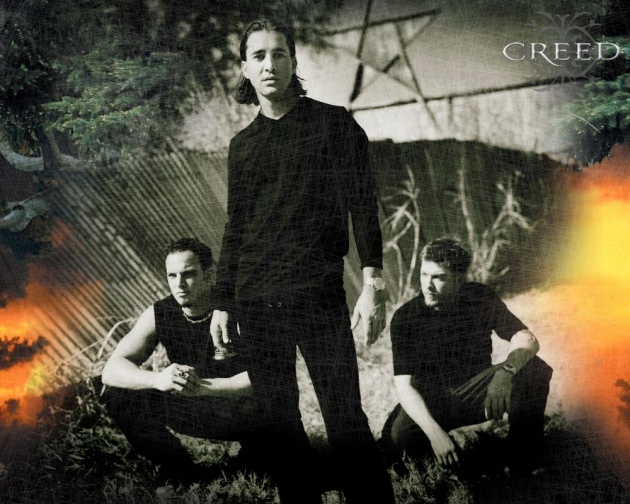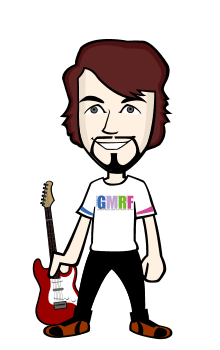
Creed Overview:
Creed were one of the most popular bands of the late 1990s, combining earnest vocals with lumbering power chords to create songs that aimed for a sweeping, inspirational tone. Representing a more simplistic commercial approach to the grunge rock practiced by bands like Pearl Jam, Creed dominated the charts but irritated critics. Continually having to deflect rumors that they were a Christian group because of their songs’ occasional spiritual overtones, the band lasted only three albums, but their brand of sincere hard rock paved the way for the later success
Creed's Early Days:
Creed formed in Tallahassee, Florida, in 1995, led by singer Scott Stapp and guitarist Mark Tremonti. The band later added bassist Brian Marshall and drummer Scott Phillips. Setting up their own label, the aptly-named Blue Collar Records, Creed started writing hearty, accessible rock songs in preparation for the release of their debut.
A Successful Debut:
My Own Prison came out in 1997 on Blue Collar before being re-released in a remixed version on Wind-Up Records. My Own Prison was indeed blue-collar rock – a condensing of grunge’s bellowing angst into everyman laments and straightforward song structures. Frontman Scott Stapp had the same deep baritone as Pearl Jam’s Eddie Vedder or Soundgarden’s Chris Cornell, and Mark Tremonti’s guitar echoed the Seattle sound’s soft-verse/loud-chorus template. The album capitalized on grunge’s popularity, going double-platinum within about a year.
Attaining Superstar Status:
My Own Prison had been successful, but it wasn’t nearly as huge as Creed’s next album.
1999’s Human Clay was a more demonstrative musical and emotional experience, turning every song into a full-throttled exploration of love and lost. The band’s vaguely religious sentiments may have turned off some, but hits like “With Arms Wide Open” and “Higher” were simply everywhere on the radio. Human Clay has gone on to be certified platinum 11 times over, becoming one of the 60 biggest-selling albums of all time.
Problems Start to Surface:
Creed’s band unity began to show some cracks after the release of Human Clay. Bassist Brian Marshall left the band after the Human Clay tour, reducing Creed to a trio. But the problems were also obvious by listening to 2001’s Weathered. Although never critical darlings, Creed sounded creatively exhausted on the album, trying to stick to a commercial formula that was running out of juice. Still, Weathered proved to be a dynamic seller, even if it was clear that the band’s fortunes were in decline.
The Breakup:
Creed’s eventual breakup has been blamed on different factors, but one clear cause was Stapp’s addiction to alcohol and drugs. In addition, he was arrested in Florida in 2002 and charged with reckless driving. The band split up in 2004. Stapp released a solo album,The Great Divide, in 2005 – it failed to capture the public imagination like Creed’s records had. Meanwhile, the rest of the band, including Marshall, formed Alter Bridge with a new lead singer, Myles Kennedy, and released two albums. But Alter Bridge also were unable to duplicate the sales Creed once enjoyed.
The Reunion:
Near the end of 2008, Alter Bridge’s lead singer Myles Kennedy was rumored to be joining the Led Zeppelin reunion tour as a replacement vocalist for Robert Plant. These rumors opened the door to speculation that Creed would be reforming for a 2009 tour. Creed made it official in April 2009, announcing a new album and tour. On October 27, 2009, Creed released Full Circle, their first new studio album in eight years.
Creed Lineup:
Brian Marshall – bass
Scott Phillips – drums
Scott Stapp – vocals
Mark Tremonti – guitar
Key Creed Songs:
“What’s This Life For”
“Higher”
“With Arms Wide Open”
“My Sacrifice”
Creed Discography:
My Own Prison (1997)
Human Clay (1999)
Weathered (2001)
Greatest Hits (2004)
Full Circle (2009)
Creed Quotes:
Scott Phillips, on the secret to Creed's appeal.
"I think a lot of kids identify with Scott [Stapp]'s lyrics, especially kids who live in the Bible Belt. They can relate to it because it's stuff that has happened to them, or is still happening." (NY Rock, May 1999)
Brian Marshall, on assumptions that Creed is a religious band.
"Scott writes the lyrics and he had a very religious upbringing, but it doesn't mean we're religious. He uses it as a metaphor. That's different. He uses the symbolism, but that doesn't mean we're Christian rock." (NY Rock, May 1999)
Scott Stapp, on his own faith.
"[W]hen someone asks me if I'm a Christian, I have to say yes, because I am. But do you know I was never asked in 10 years if I was a Christian personally? We were only asked if Creed was a Christian band." (Christian Music Today, August 9, 2004)
Scott Phillips, on the band's legacy.
"I think we're a band who'll be around in 10 years time, and people will talk about our songs and not about our escapades." (NY Rock, May 1999)
Scott Stapp, on why Creed broke up.
"Mark and I had been working together for the last 10 years. There comes a point with any collaboration like that where you start having other interests creatively. I was moving in one direction musically, and as a guitar player Mark wanted to move in another direction. That was essentially the reason we broke up." (Christian Music Today, August 9, 2004)



